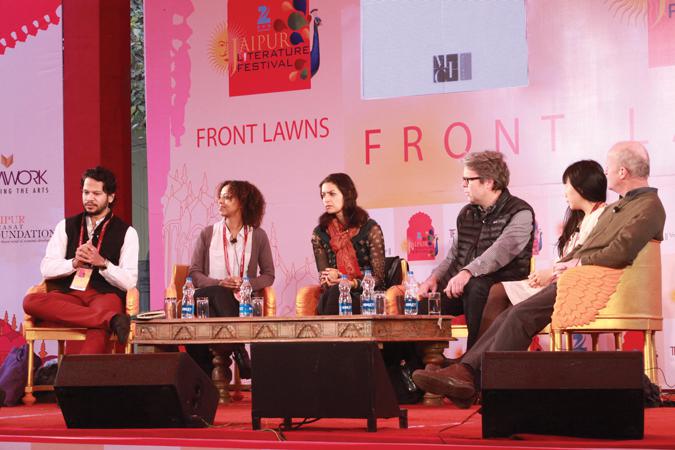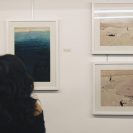It was difficult to take a step without bumping into a writer or high profile celebrity. The seventh edition of the five day Zee Jaipur Literature Festival brought together over 240 authors and thinkers from 15 countries, and thousands of book lovers.
If your first love is words, this was it. The event served as a hub for the creative, as the heritage venue of Diggi Palace was awashed with the winter sun and the myriad hues of romance with the written word.
I was quite dazed at the fair’s vast venue, the sight of hundreds and thousands of books, book lovers, tweeters and live bloggers. The event was an incredible experience and a happy affirmation that books reign supreme and print is not dead.
Nobel laureate economist Dr. Amartya Sen delivered the keynote address. One of the strongest points that he made during his speech was on education. Sen said, “We seriously need to cultivate classical education like the arts, language and culture.” His parting advice to the audience: “Read books.”
Iconic women’s rights activist Gloria Steinem left an indelible mark on the audience at a session titled ‘The Essential Gloria Steinem.’
“I don’t understand why feminism is viewed as a Western idea, it is everywhere,” she questioned.
In a discussion titled ‘The Interpreter of Stories’, Pulitzer Prize winning author Jhumpa Lahiri discussed how observing her parents cope with the experience of living away from their homeland served as literary stimulus.
“Growing up, I was always aware of the degree to which my parents missed Kolkata. Many of my characters have a unique relationship with their homeland – the city they leave behind but continue to be connected with,” she commented. “Our identity is our strength,” she reiterated.
In another animated debate titled ‘The Global Novel,’ Lahiri opined that she is uncomfortable with the use of ‘global’ in the context of literature. “Readers should get to read what they want and as widely as they want. This can only happen if publishers and translators give them access to books.”
“Our reading habit has been stolen and changed” said Chinese-British writer Xiaolu Guo.
British author Jim Crace disclosed that writing a novel is a private affair.” It’s a private act that becomes embarrassingly public. But I think as a reader I would definitely want to read more and learn about other cultures, struggles. It helps all of us to grow and understand. Narratives will never die, whatever form of publication or dissemination method is used to spread it. If there is a great book, it will always find its audience,” added Crace.
In a compelling conversation titled ‘The Rasa of language: On Art, Pleasure and Technology,’ bestselling writer Vikram Chandra made a surprising comparison between Sanskrit grammar and coding.
The festival included an eclectic range of events. Photographer Dayanita Singh and artists Subodh Gupta and K.S. Radhakrishnan had a very forthright discussion on many facets of contemporary Indian art. The artists were of the opinion that much needs to be done to improve the basic infrastructure to support India’s art boom.
William Dalrymple, award-winning British historian and writer and co-founder of the Jaipur Literature Festival, moderated a very interesting discussion on ‘The Nonfiction Renaissance,’ between Antony Beevor, Geoff Dyer and Reza Aslan.
Iranian-American scholar Aslan commented that non-fiction adds a voyeuristic element to the readers; who find a window into the lives of others. According to Aslan, there are two genres of writing: Good Writing and Bad Writing.
Noted American novelist and essayist, Jonathan Franzen, while speaking about the art of novel writing, said he had to unlearn the often prescribed lesson, “Show, don’t tell.”
In another compelling debate, titled ‘Behind the Veil – Women Writers of the Islamic World,’ Nadifa Mohamed, Bejan Matur, Shereen el Feki and Fariba Hachtroudi interpreted their own worlds and proved to be very popular at the Festival.
In a similar vein, another interesting discussion was ‘Burdens of Identity,’ that saw coming together of diverse voices of best-selling author Zeruya Shalev, Tamil poet and writer Salma and novelist Namita Gokhale who spoke of the burden of labels that spanned religion, region and gender.
The DSC prize for South Asian Literature went to Indian author Cyrus Mistry for his Chronicles of a Corpse Bearer. The $ 50,000 DSC Prize recognizes works of fiction from across the globe that highlights South Asia, its people, culture and diaspora.
The event was a perfect winter tale. If you missed this literary extravaganza this year…book your tickets to Jaipur now. Next year will only see the festival grow bigger and better. A must visit event for literature enthusiasts.
Any tips? Oh yes. Make sure you wear comfortable shoes. Signature lines require lots of standing.
The festival is due to return next year – January 21 to January 25, 2015. For updates, keep your eye on www.jaipurliteraturefestival.org











